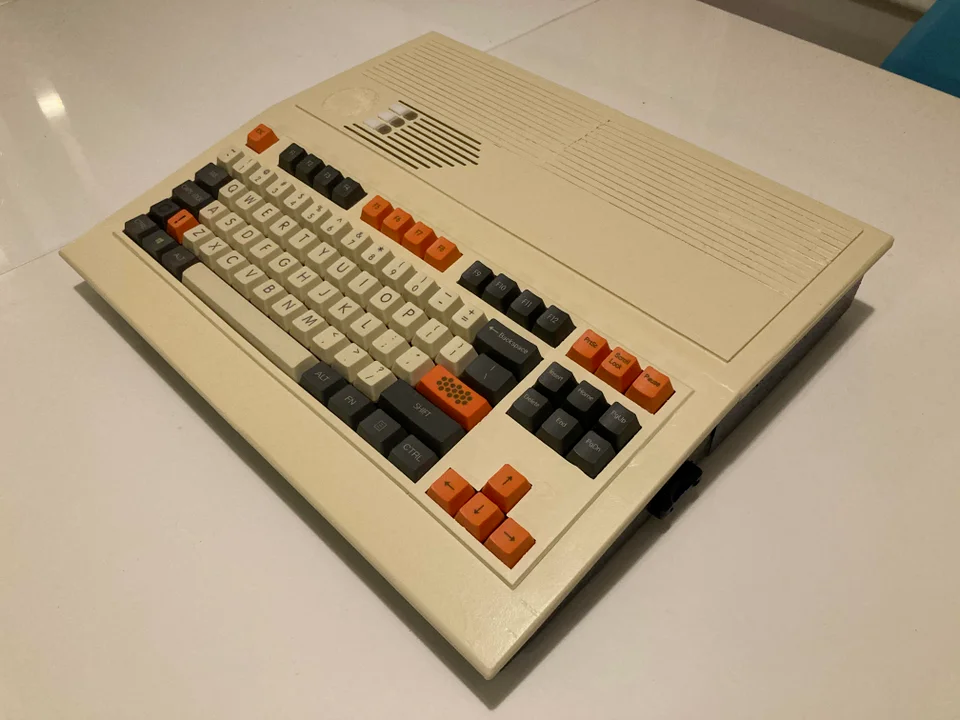Fine editor for working with Duet boards
-
@phaedrux said in Fine editor for working with Duet boards:
People also like to build them into wedge style keyboard cases for the extra authentic look.

I don't recognize that one.
I had a Atari 800, a Commodore 64, a big CompuPro chassis with a 68000 cpu card, a HeathKit H89 (two of them actually) before moving onto DOS based machines.
Frederick
-
One of my "back in my day" sayings for the new kids used to be showing them a 3.5" dual density (2.88MB - size defined to 2 decimal places) floppy disk in a hard case and tell them this was the "premium" small portable storage 30 years ago. Then I'd tell then how many it would take to store the same amount as a modern device. Today, that's a 1TB micro SD card (that us old guys can barely handle, they're so tiny). So, roughly 350,000 old-style disks. They were about 1/8 inch thick, so a stack of 350K would be over 3600 feet tall.
Oh yeah, and we had to write to those old ones with a piece of charcoal by candle-light. After walking 5 miles to work through snowdrifts.
And they hadn't even invented espresso.
Harumpf.
-
@fcwilt said in Fine editor for working with Duet boards:
I do envy you young folk.
Young folks? Welcome to the geriatric squad!

-
@mikeabuilder said in Fine editor for working with Duet boards:
Today, that's a 1TB micro SD card (that us old guys can barely handle, they're so tiny). So, roughly 350,000 old-style disks. They were about 1/8 inch thick, so a stack of 350K would be over 3600 feet tall.
That reminds me of something I heard once: "Never underestimate the bandwidth of a 747 packed with hard drives."
This actually proved true recently with radio telescope data spread out across the globe gathering terabytes of data. The fastest way to process it all is to take the drives as carry on luggage to a central location for processing.
-
The freeware program WinSCP should also work to edit the files on the Duet via FTP.
Yes, the good old days.
My first computer had 3" diskettes... exactly, not 3.5" but 3". It was a Schneider CPC, one of the first with a color monitor at the time.
In DOS and Win 3.11 you used to know every file and what it does... unthinkable today.
You fought for every byte in Autoexec.bat and Config.sys
Our Internet was called BBS (Bulletin Board System) and our modem was called "Acoustic Coupler" where you had to put the telephone receiver on it, the WWW came out much later.
It was a good time.Google Translate / German > English
-
Only by 4 years, @deckingman!
-
@nightowl999 said in Fine editor for working with Duet boards:
Only by 4 years, @deckingman!
But those last two were really long!

70 was a piece of cake, 72 is looking a bit tougher.
Frederick
-
@phaedrux said in Fine editor for working with Duet boards:
That reminds me of something I heard once: "Never underestimate the bandwidth of a 747 packed with hard drives."
… or, back then, a car full of floppy disks. High bandwidth, but with a latency of hours or days

-
@owend said in Fine editor for working with Duet boards:
I don't know if there are any rules per se.
Mostly they use some sort of regex or keyword list to determine what to highlight.I dug into the Custom Syntax Coloring Scheme Editor that was available from the vendor.
Since the Java scheme provided some basic coloring that made sense I started with that and edited it into a scheme for GCode.
It was much easier than I thought. And you were right it was basically a set of regex expressions each one handling a comment, variable, reserved word and so forth.
Having not used regex expressions very often I had to learn a bit but the vendor has two tools for dealing with them - RegexBuddy and RegexMagic.
It was actual kind of fun to see the elements start to be colored according to the rules I was creating.
Thanks for pointing that is was possible.
Frederick
-
@mikeabuilder I can go back a bit further and distinctly remember the 8" floppy that wasn't in a hard plastic case but more like a thin cardboard sleeve. IIRC, it could hold about 720k of data.
-
@deckingman My first computer: Timex-Sinclair ZX81, then got a Color Computer 2 16k, upgraded to 64k and extended basic , floppy drive , multipak interface, use Microware's OS9 Level One.
Then got a Color Computer 3, upgrade 512k, DISTO floppy controller, and Microware's OS9 Level Two, then got a SuperIDE interface, now using NitrOS9. Still have them.